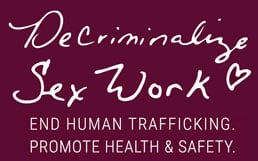There used to be tens of thousands of prostitution arrests annually in NYC. Now? About 100. | Gothamist
Prior Sex Work Haunts Employees Returning to Traditional Jobs | Bloomberg Law
Manhattan DA urges for passing of bill providing immunity to sex trade survivors | PIX11
Bill would allow sex workers to report crime without fear of prosecution | Gothamist
NY District Attorney Bragg Includes Landmark Sex Work Reform in Policy Statement
January 3, 2022
Newly elected Manhattan District Attorney (DA) Alvin Bragg, the first African American to be elected DA in New York City, knows that limiting incarceration to a last resort, one reserved for violent crime, will make our communities safer. Bragg’s recently released policy statement, which lays out the goals and guiding principles for his tenure as district attorney included Prostitution (PL § 230.00) among the charges that the office will no longer prosecute. In a historic move, Bragg has also stipulated that supervisory approval will be required to prosecute Patronizing a Person for Prostitution (PL § 230.04), so long as no signs of coercive practices or money laundering are present.
Bragg’s initiatives center on data-driven policies that have been proven to increase safety and equity as well as his own experiences growing up in a New York plagued by racism and inequality. Decades of research have shown that decriminalizing consensual adult sex work increases public health outcomes by allowing sex workers to access adequate healthcare and other critical resources and also increasing worker agency to engage in safe workplace practices. Decriminalization also hinders trafficking and other violent crime in the sex trade as workers and clients are able to report crimes committed against them, and others to law enforcement without fear of arrest. Soon, we may have the opportunity to see this playing out across New York City.
Over the last decade, the Manhattan District Attorney’s office has taken critical steps to recognize sex worker rights. Just last April, former DA Cyrus Vance announced that his office would no longer prosecute prostitution or unlicensed massage, a statute used largely to arrest East Asian immigrants working in the massage business. New York county was also the first to stop prosecuting Loitering for the Purposes of Engaging in Prostitution (PL 240.37) due to its vague and discriminatory nature, used overwhelmingly to profile and harass transgender women of color. The statute was repealed last year.
This most recent announcement is by far the most groundbreaking reform on this issue. Too often law and policymakers conflate prostitution and human trafficking with commercial sex. Policies and rhetoric treat sex workers as victims and their clients as exploitative criminals, ignoring the fact that trying to “save” sex workers by criminalizing their livelihoods only makes their work more dangerous. DSW is grateful that DA Bragg is acknowledging the difference between sex work and human trafficking and making a concerted effort to combat exploitation while increasing the safety and health of our communities. We can only hope that New York County will provide a roadmap for other jurisdictions to follow suit.
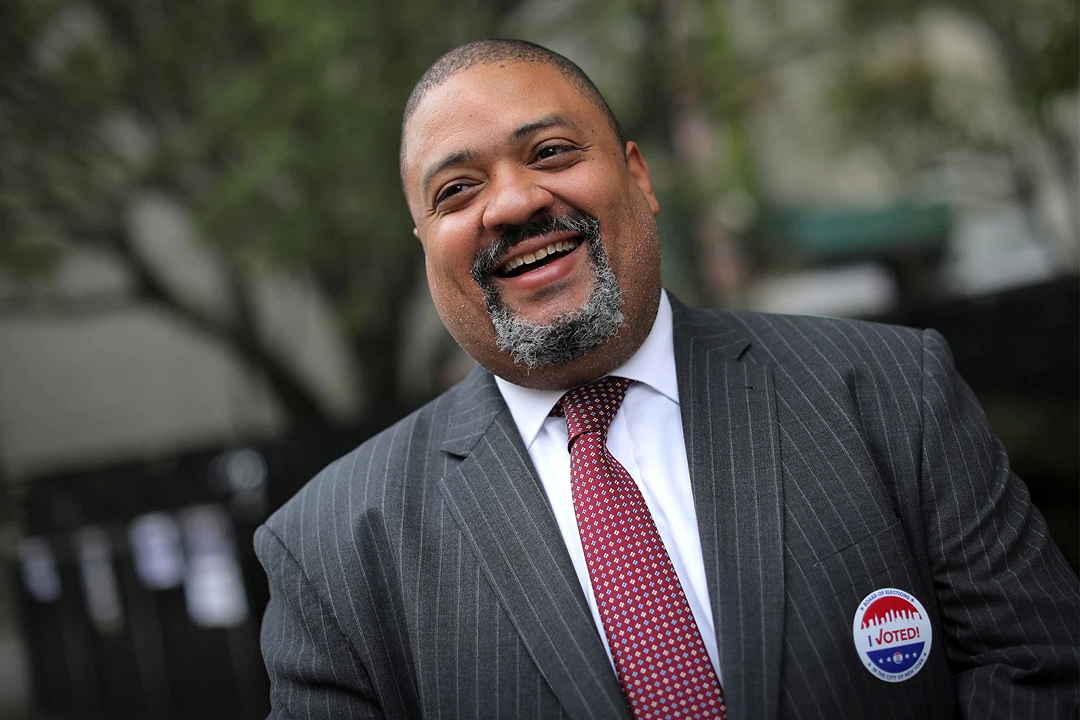
Civil Rights Lawyer and former Federal Prosecutor Alvin Bragg has been elected as Manhattan’s first African American District Attorney. (Reuters, 2021)
DSW Newsletter #32 (January 2022)
State Bills to Watch in 2022

January Is Human Trafficking Awareness Month
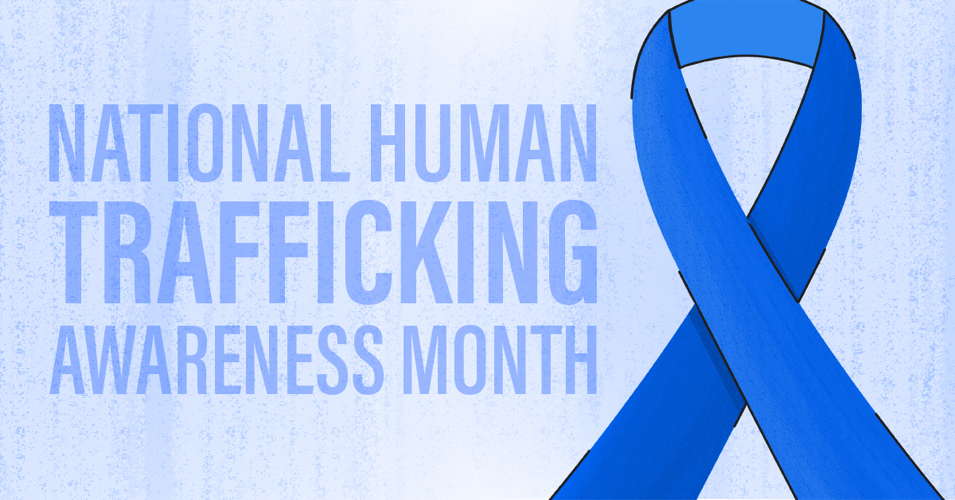
Federal Courts Rule, Title IX Protects Sex Workers from Discrimination
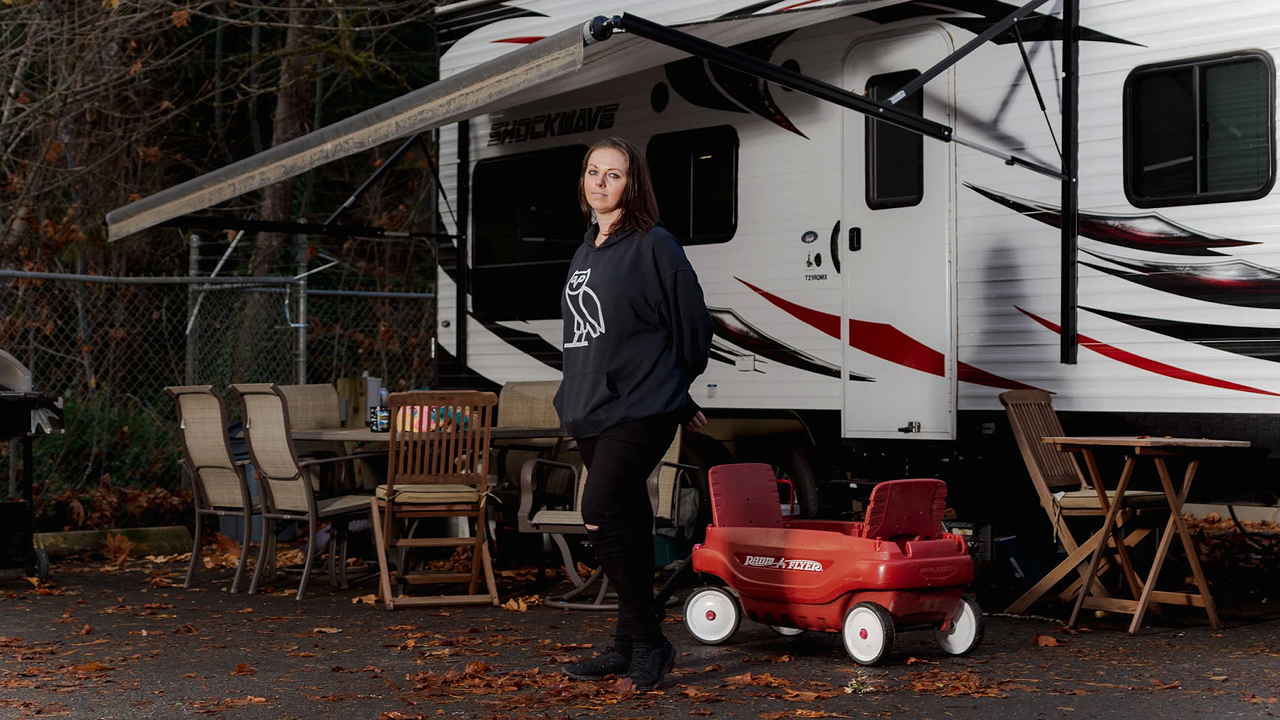
2022 Bills That Endanger Sex Workers
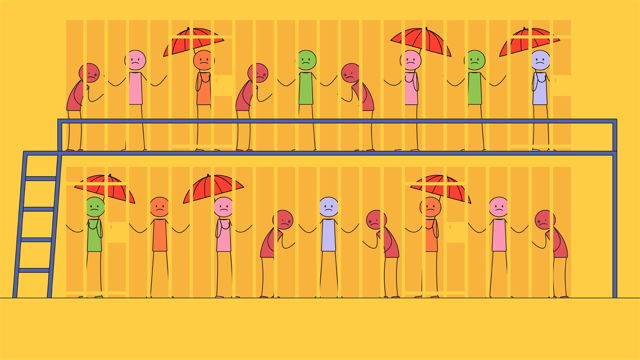
NY District Attorney Bragg Includes Landmark Sex Work Reform in Policy Statement

The Legacy of Gilgo Beach: Protect Sex Workers
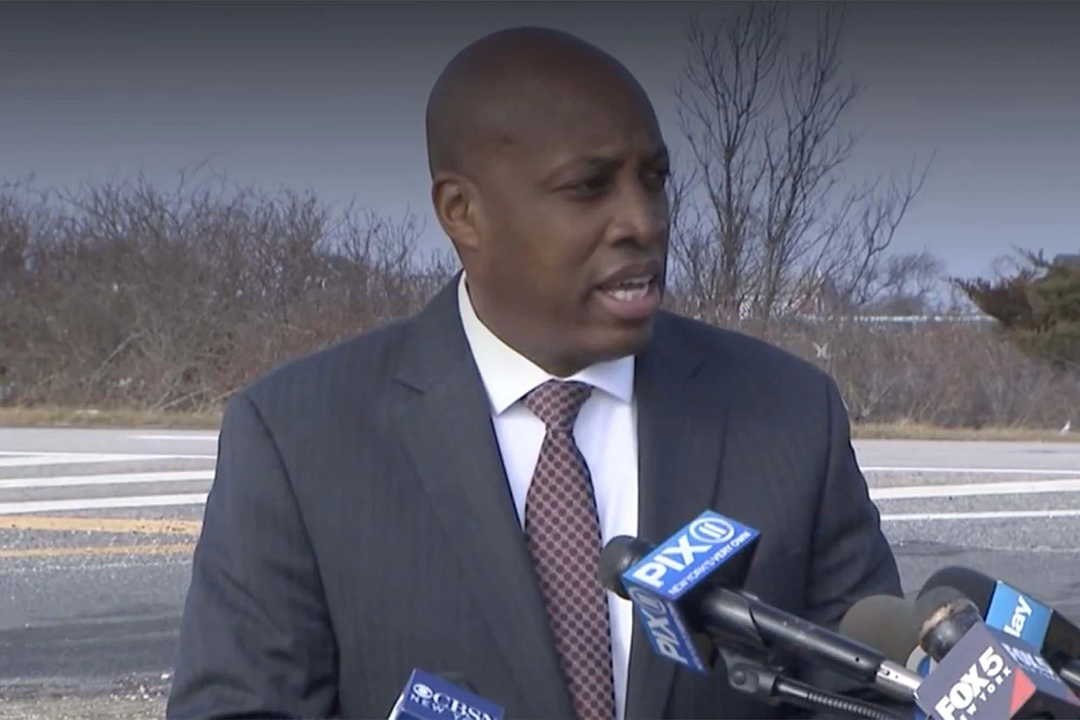
DSW Newsletter Archive
2022 Bills That Endanger Sex Workers
January 1, 2022
Although legislators are increasingly recognizing the harms of criminalizing sex work, as this year’s legislative session opens, lawmakers continue to propose bills that endanger the rights, health, and safety of sex workers across the country. These laws increase criminal penalties, present new criminal categories around commercial sex, increase surveillance, or propose to decriminalize the sale, but not the purchase of sex work. Below is an explanation of several pieces of legislation which, if passed, would have a significant impact on sex workers’ ability to survive.
There are currently three different state bills that propose to decriminalize the sale of sex but maintain penalties for purchasing sexual services. S940/H1761 in Massachusetts, S6040/A7069 in New York, and S771 in Rhode Island propose this model known as the “Entrapment Model,” the “End Demand Model,” or the “Swedish Model” of criminalization. The bill introduced in Rhode Island is slightly different in that it does not remove all criminal penalties from prostitution but rather makes it a civil offense with fines attached.1 This mode of criminalization promotes the belief that sex work is inherently exploitative, painting all sex workers as victims and all clients and third parties as abusers. Not only is this a false and dangerous assumption, but the policy is ineffective. By focusing on demand, the model aims to abolish commercial sex altogether. While it may seem appealing to those who object to prostitution, in reality, the entrapment model does nothing to impact demand. Where and when it has been implemented, sex workers experience an increased risk of violence and assault and heightened stigmatization and unease.
In Wisconsin, SB836 is a bill proposed to regulate adult-entertainment establishments. In effect, the bill prevents trafficking survivors and sex workers from working at or owning such establishments by prohibiting people who have been convicted of certain offenses (including prostitution-related crimes) from owning or working at strip clubs. The bill also prohibits adult-entertainment establishments from having employees who have been the victim of certain trafficking offenses. It requires establishments to post a human trafficking poster created by the Department of Justice in a prominent location for employees to view. The bill also mandates that these businesses furnish a list of their employees, operators, and owners to local law enforcement officials upon request. This law not only violates the privacy of employees but it infringes upon the rights of survivors of trafficking and sex workers and their ability to earn a living.
AB139/SB26 was also proposed in Wisconsin. The bill is a penalty increase for individuals convicted of patronizing or soliciting a prostitute, pandering, or keeping a place of prostitution. Under the proposed law, a $5,000 surcharge would be imposed to be used for treatment and services for sex-trafficking victims and for investigative operations relating to internet crimes against children. Most state crime fees in Wisconsin are $67 per count for misdemeanors and $92 per count for felonies. While the creation of resources for survivors of sexual exploitation seems positive, the method of collecting these funds creates complications. The bill imposes a disproportionately high charge on misdemeanor crimes which would have a deleterious impact on the lives of indigent offenders, putting many in debt to the court system. It is also clear from the language of the bill that it conflates consensual adult sex work and human trafficking, meaning that many of the funds created to service the needs of human trafficking survivors might in reality be used to create mandatory programming for sex workers who have been convicted of prostitution. This not only wastes resources, but the criminalization of poverty in the United States perpetuates cycles of criminalization and victimization.
Another bill that increases penalties for crimes related to commercial sex was introduced in Florida. HB521/S760 provides criminal penalties for receiving value from human trafficking, using labor or services, or commercial sexual activity of an adult. The law also prohibits facilitating or enabling prostitution, lewdness, or facilitating or enabling any person to remain in a location for such purposes and increases criminal penalties for specified prohibited acts relating to prostitution, lewdness, or assignation. While on its face, the legislation is an anti-trafficking bill, in reality, its motives are prohibitionist. The law aims to discourage prostitution by increasing the criminal penalties for many common third-party activities used by sex workers to make their work safer, thus putting them at risk.
Many of these bills are proposed with the intention of helping survivors of human trafficking escape exploitation and rebuild their lives. However, because of the deep-rooted conflation between human trafficking in commercial sex and consensual adult sex work, these laws create unintended harm for both sex workers and survivors. If you are a resident of any of these states and want to protect the rights of sex workers and related communities, please reach out to your representative and ask them to oppose these bills.
________________________
1 One positive attribute of the Rhode Island bill is that it repeals the authority to detain a defendant in the event they test positive for venereal disease.

(DSW, 2021)
DSW Newsletter #32 (January 2022)
State Bills to Watch in 2022

January Is Human Trafficking Awareness Month

Federal Courts Rule, Title IX Protects Sex Workers from Discrimination

2022 Bills That Endanger Sex Workers

NY District Attorney Bragg Includes Landmark Sex Work Reform in Policy Statement

The Legacy of Gilgo Beach: Protect Sex Workers

DSW Newsletter Archive
State Bills to Watch in 2022
January 1, 2022
Bills to decriminalize sex work are being considered in New York (S3075/A849), Massachusetts (H1867), Vermont (H630), and Missouri (H2388). Several other pieces of legislation to improve the health, safety, and human rights of sex workers and related communities have been introduced around the country.
Massachusetts also saw the introduction of S947, proposed by Senator Sonia Chang-Diaz. The bill would support survivors of trafficking and abuse by increasing eligibility for expungement and the sealing of records. If passed, survivors would be eligible for expungement for all crimes they were compelled to commit as a result of their exploitation. This bill is similar to the Survivors of Trafficking Attaining Relief Together (START) Act, enacted in New York last year. The New Jersey Senate also recently passed S3433 which would similarly provide a process to vacate and expunge the convictions of human trafficking survivors. The governor signed the bill into law this month.
New York and Rhode Island have both proposed Good Samaritan Bills [also known as immunity]. These laws are critical to the health and safety of sex workers and broader communities. Because of criminalization, sex workers often do not report crimes committed against them for fear of arrest and prosecution. Good Samaritan laws, as proposed, provide limited immunity from prosecution for individuals engaged in prostitution who are victims of or witnesses to a crime, allowing them to come forward without risking prosecution.
Rhode Island has two other important bills that have been introduced this session to protect sex workers’ rights. The first, H6049/S249, criminalizes custodial sexual assault of defendants in the custody of a peace officer. An offense under this law would be subject to imprisonment for up to three years. There is a pattern of sexual abuse of sex workers at the hands of law enforcement across the United States. Vice divisions have used criminalization to coerce sexual favors from sex workers. A 2019 Johns Hopkins University study also found that abusive police interactions with sex workers increase the likelihood of violence at the hands of clients. These findings are reflective of the general stigmatization directed at sex workers, encouraging tacit acceptance, and sometimes even perpetuation, of violence against them by law enforcement.
H5464, also introduced in Rhode Island, would establish non-discrimination standards for healthcare providers in the state. The bill mandates that any patient seeking services “shall not be denied appropriate care on the basis of age, sex, gender identity, sexual orientation, race, color, marital status, familial status, disability, religion, national origin, source of income, source of payment, or profession.” Sex workers are commonly subjected to discrimination and stigma when seeking healthcare which results in inadequate care and nondisclosure. Discrimination may stop sex workers from seeking services at all. If passed, this bill will create important protections for sex workers and other marginalized communities when accessing life-saving care.
In New York, A8281 was recently introduced in the State Assembly to remove unauthorized or unlicensed practice of massage therapy, and aiding or abetting unauthorized or unlicensed practice of massage therapy, from the criminal statute of unauthorized practice. This legislation is intended to put an end to the routine harassment and abuse of the largely immigrant population working in massage parlors in certain counties by NYPD’s vice division. Vice routinely conducts stings at massage parlors in certain neighborhoods under the guise of “rescuing” women from trafficking rings. Undercover officers request sex acts at the end of an appointment. If the masseuse agrees, they are arrested for prostitution, and if they say no, the officer can still charge them with unlicensed massage under the Unauthorized Practice of a Profession statute (ED 6512). Immigrant women of Asian descent have been disproportionately targeted for these arrests. Between 2015 and 2019, 93.3% of unlicensed practice of a profession arrests were of Asian-identified individuals, increasing by 2700%. 91 percent of the 2016 cases were against non-citizens.
The Gender Identity Respect, Dignity, and Safety Act (S6677/A7001), also introduced in New York, would amend the state’s corrections law. The bill “requires that incarcerated people in state and local correctional facilities who have a gender identity different from the person's assigned sex at birth be addressed and have access to commissary items, clothing, and other materials that are consistent with the person's gender identity.” It also mandates that individuals be placed in correctional facilities with people of the gender that they most closely align with, with the freedom to change their placement. This bill creates essential protections for transgender, non-conforming, and non-binary (TGNC/NB) community members. When TGNC/NB are placed in the wrong prison or jail, many are subjected to violence, harassment, psychological distress, or blocked from medical care.
DSW will continue monitoring and reporting on bills, such as these, which are important to the rights of sex workers and related communities. We urge readers who are residents of states with active legislation to reach out to their representatives and ask them to support these bills.
Visit https://decriminalizesex.work/advocacy/take-action-your-state/ to send letters in support of decriminalization to your legislators.

(SWARM Collective, 2013)
DSW Newsletter #32 (January 2022)
State Bills to Watch in 2022

January Is Human Trafficking Awareness Month

Federal Courts Rule, Title IX Protects Sex Workers from Discrimination

2022 Bills That Endanger Sex Workers

NY District Attorney Bragg Includes Landmark Sex Work Reform in Policy Statement

The Legacy of Gilgo Beach: Protect Sex Workers

DSW Newsletter Archive
Gov. Hochul Signs START Act Into Law
November 16, 2021
In a historic and long-fought victory, New York Governor Kathy Hochul signed the Survivors of Trafficking Attaining Relief Together (START) Act into law. The START Act (A459/S674), sponsored by Senator Jessica Ramos and Representative Richard Gottfried, will allow New York State courts to vacate a range of criminal convictions stemming from a person’s experience as a victim of sex trafficking or labor trafficking. New York set an example when they passed the nation’s first vacatur law in 2010, allowing criminal record relief for survivors convicted of prostitution or prostitution-related crimes. DSW’s Melissa Sontag Broudo won the first-ever vacatur motion for a survivor of human trafficking in the country under that law.
But as advocates and policy experts know, individuals are trafficked into many types of labor outside of commercial sex and can be compelled to commit a range of crimes while being exploited. The former vacatur law left the vast majority of survivors of trafficking unprotected, subject to criminal penalties for crimes they had no choice in committing. Since New York’s law passed a decade ago, many other states recognized this need and passed vacatur laws that go further, protecting more survivors. Broudo, along with DSW’s Crystal DeBoise, are members of the coalition that has been pushing New York to expand its vacatur law. They teamed up with fellow attorneys, advocates, and service providers from the New York Anti-Trafficking Network (NYATN) to create the START Coalition and pass a law that includes all survivors.
The coalition has been advocating for years to bring about this victory, gaining support from district attorneys’ offices, service providers, and impacted community members from around the state. Expanding criminal record relief is an essential lifeline for many survivors, who are trying to reclaim their lives. A criminal record prevents many from being eligible for certain jobs, housing, healthcare, and other essential resources, and can have severe immigration consequences. Throughout the process of passing this bill, sixty brave survivors shared their stories with New York lawmakers to shed light on the impact vacatur could have on their lives and their communities. Sponsor Jessica Ramos delivered remarks right before the governor signed the bill, saying “the longer a survivor has a record the longer they stay vulnerable to further exploitation. Th[is] bill will lessen the barriers to employment, improving access to immigration legal remedies, & helping break cycles of trauma.”
In a thank you letter to all its supporters, the START Coalition noted, “This advocacy has truly been survivor-centered, and we could not have come this far without the testimonials and advocacy of survivors who envisioned a more just criminal legal system that actually places survivors first.” DSW is humbled to have witnessed the incredible work of survivors and advocates from the New York Anti-Trafficking Network and allied groups. This law will change the lives of many from within our own community and beyond.
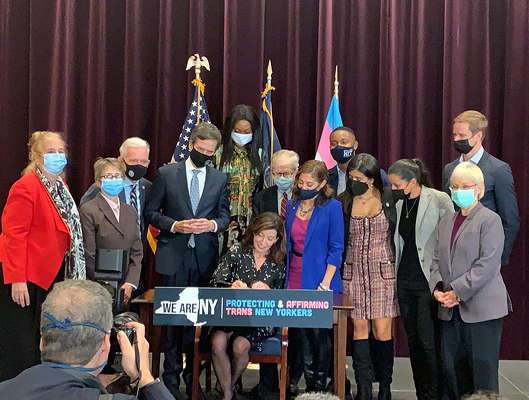
Governor Hochul Signs the Survivors of Trafficking Attaining Relief Together (START) Act surrounded by the bill’s sponsors and advocates. (NYATN, 2021)
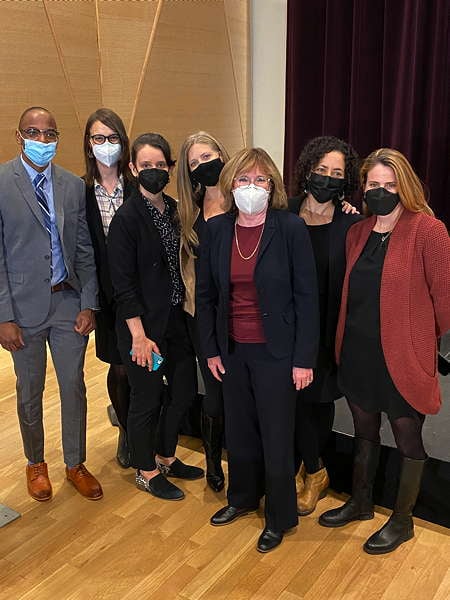
Members of the START Coalition pictured at the signing of the bill. From L to R: Jared Trujillo of NYCLU, Andrew Bowen of The Sex Workers Project, Kathleen McKenna of Brooklyn Defender Services, Melissa Broudo of DSW, Kate Mogulescu of Brooklyn Law School, and Leigh Latimer and Abigail Swenstein of the Legal Aid Society’s Exploitation Intervention Project. (DSW, 2021)
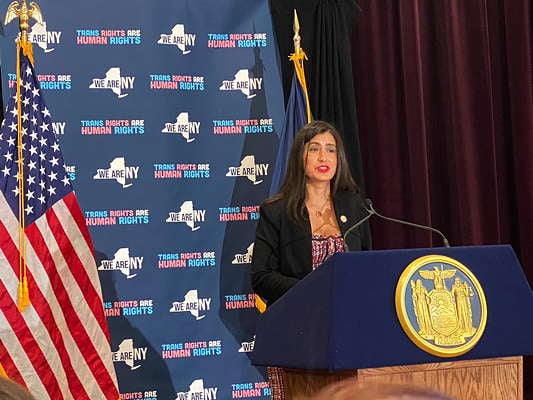
Sponsor NY Senator Jessica Ramos delivers remarks on the bill right before signing. (NYATN, 2021)
DSW Newsletter #30 (November 2021)
Gov. Hochul Signs START Act Into Law

Commission Studying Sex Work Law and Policy Convenes in Rhode Island
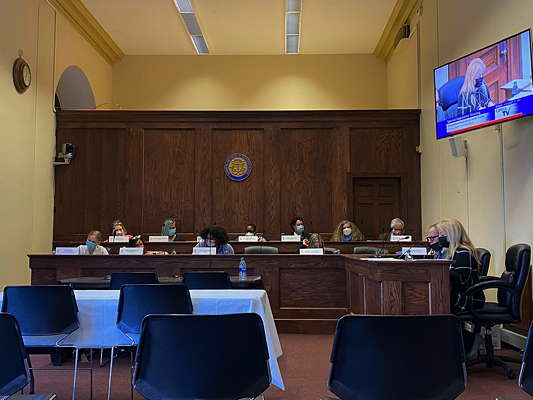
Decriminalization Gaining Momentum in Oregon
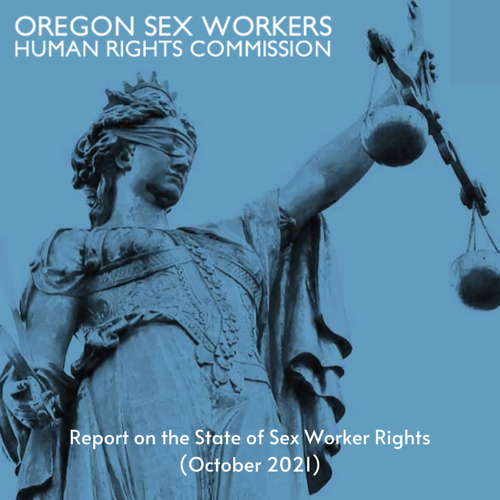
Conferences
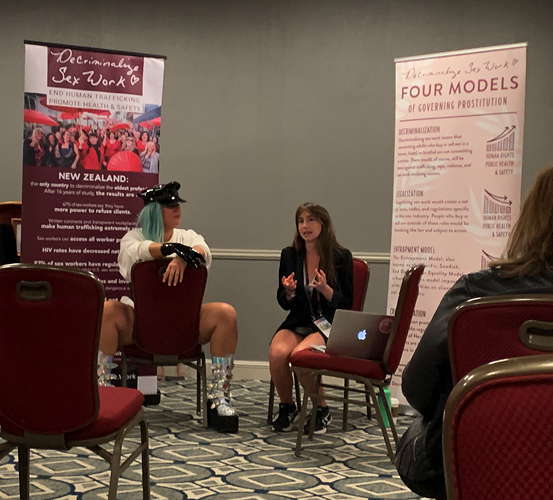
Transgender Day of Remembrance
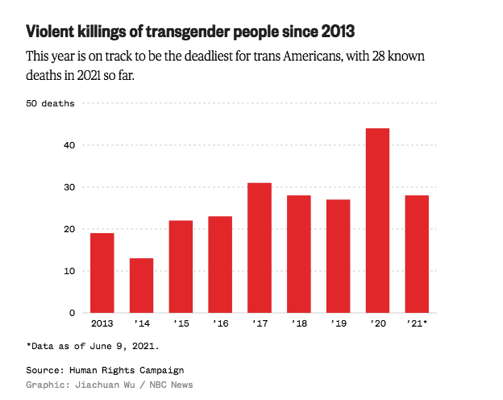
Hero of the Month: Gwendolyn Ann Smith

Save the Dates

